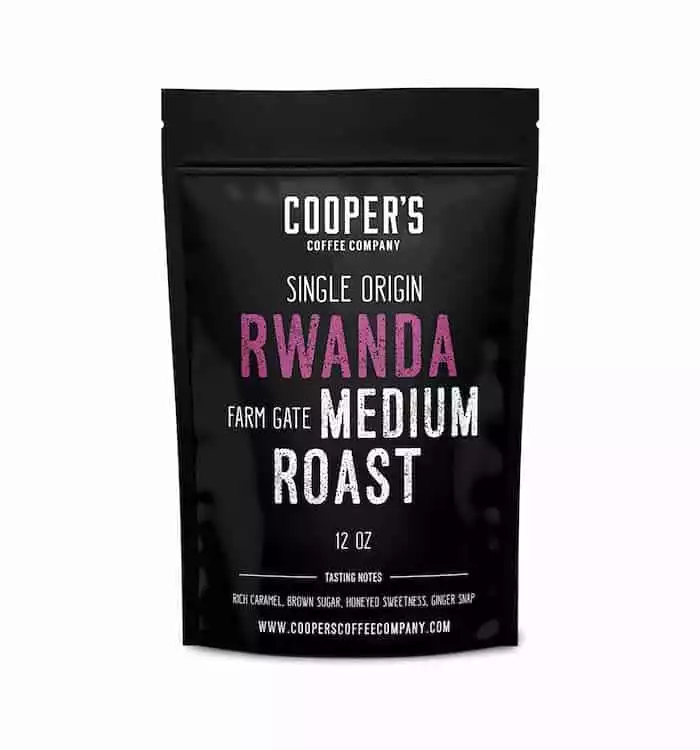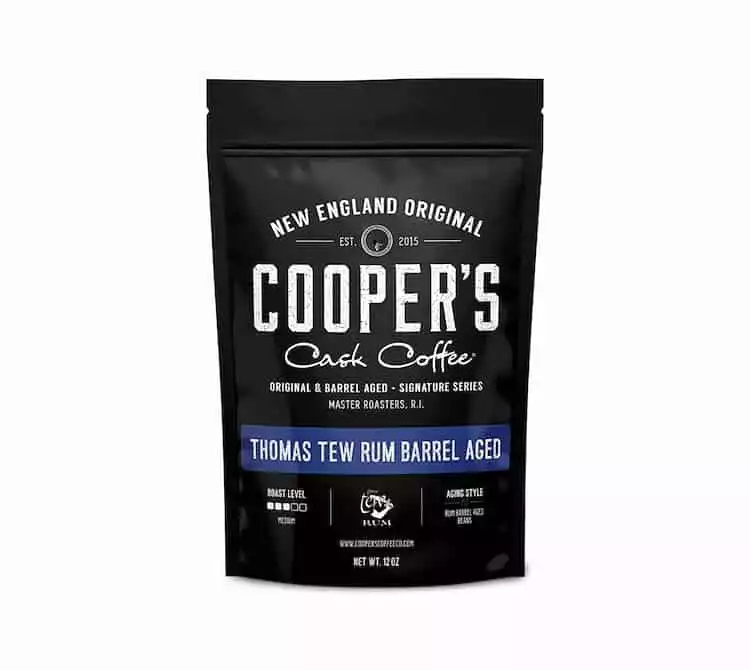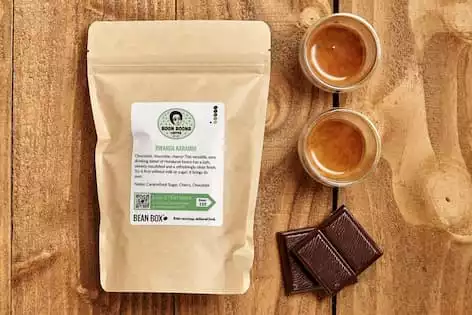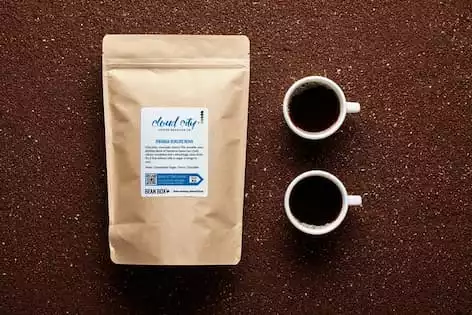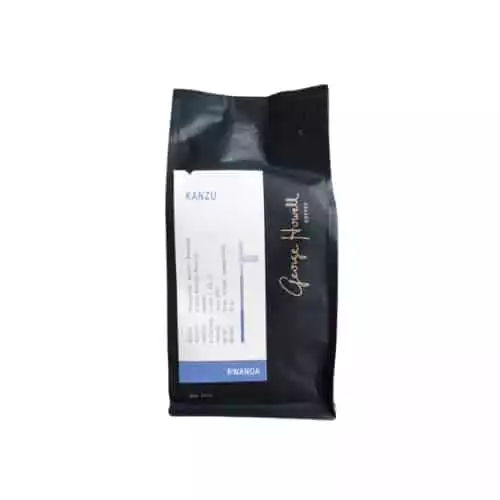Rwanda Coffee: The Most Underrated African Beans?
African coffee is known for its tart and fruity flavors.
But, when you think of coffee from this region of the world, Rwanda is likely not the top of mind. Most favor coffee from Kenya or Ethiopia, but Rwandan coffee is an upcoming origin for specialty and gourmet standard beans.
The Rwandan coffee industry might have only started in recent history, but they’ve steadily made waves in the specialty coffee scene.
In this article, we’ll be diving into our recommendations for the best Rwanda coffee, but first, starting what sets this region apart from other coffee regions. Nonetheless, if you’re in a rush, here’s our top pick:
Tasting notes of sweet caramel, brown sugar and ginger. Comes with a 30 day money back gaurantee!
Rwanda Coffee History
The coffee industry was introduced to Rwanda by way of the bourbon variety via European missionaries during the early 1900s.
Since then, coffee has slowly become one of the country’s cash crops, albeit with an emphasis on quantity over quality up until the 1990s.
In the 1990s, Rwanda was rocked by political instability and unrest, which resulted in setbacks to the nation’s economic progression, costing the coffee industry dearly in the process.
By the 2000s, the Rwanda government eased off restrictions for coffee farmers, prioritizing quality-driven production and trade to bring the coffee industry back to its feet.
Supported by various organizations such as SPREAD or Sustainable Partnerships to Enhance Rural Enterprises and Agricultural Development, led by Dr. Timothy Schilling, World Coffee Research founder, helped foster cooperatives produce high-quality beans.
Additional advancements in cultivation and processing techniques, technical assistance, and funding helped bolster a worldwide reputation for producing cup of excellence quality beans.
Today, Rwanda remains the 30th largest coffee producer in the world due in part to the commitment made by coffee farmers to produce high-quality coffee and assistance from agricultural groups.
Coffee remains Rwanda’s number one export, with a whopping 99% of it being shipped out to the world. Most Rwandans do not brew coffee as it has been treated like a cash crop throughout its history.
Organizations such as the National Agricultural Exports Board are steadily making efforts to provide brewing techniques for farmers and locals to promote a self-sustained coffee culture within Rwanda.
Best Rwanda Coffee Brands 2024
1. Cooper Coffee Company’s Rwanda Medium Light Roast Coffee
I’m not a stranger to these Rwandan beans from the Cooper Coffee Company. In fact, it’s one of my picks in another article discussing my favorite African coffees.
Tasting notes of sweet caramel, brown sugar and ginger. Comes with a 30 day money back gaurantee!
This one’s sweet, bright, and accompanied by a creamy mouthfeel. With tasting notes of brown sugar, black tea, lemon, and ginger for a light spiciness.
The secret to this high-quality coffee is the high altitude where these beans are grown and cultivated. Reaching between 1,700 to 2,000 meters above sea level, allowing the coffee more time to ferment sugars leading to a sweeter brew.
To add the cherry on top, this Rwandan coffee is organic, fair-trade certified and farm-gate priced, which means that your coffee’s farmers get compensated adequately, and you’ll get what you’ll pay for – great coffee.
Overall, if the sound of tasty coffee with sustainabile practices to match sounds intriguiging maybe Cooper Coffee Company’s Rwanda Coffee might be the top pick for you too!
2. Cooper Coffee Company’s Rwanda Rum Barrel Aged Coffee
Generally, aged coffee beans seem like a bad idea, but that’s not the case for this barrel-aged Rwandan coffee.
Aged in Thomas Tew Rum Barrels for a unique flavor. Tasting notes include caramelized sugar, molasses and oak.
Its flavors brew well as an espresso and will have you tasting notes of all-spice, chocolate, toffee, and molasses. The secret behind this combination of flavors comes from the barrels previously used for rum.
The raw beans (green coffee) are susceptible to absorbing flavors and aroma in a closed environment, and this Rwandan coffee picks up all the smokiness and spice from the rum barrels used.
If a shot of ‘spro isn’t for you, it’s available in different grind sizes, so try it out with various brewing processes. You’ll never know what kind of flavors you’ll get with every brew from this city roast.
This rum barrel-aged Rwanda coffee from the Cooper Coffee Company is perfect if you want to try something completely different from your regular buy.
Related Read: Barrel aged coffee
3. Boon Boona Coffee’s Rwanda Karambi Coffee
Coming in from the acclaimed Nyamasheke district near Lake Kivu, this Rwanda Karambi single-origin showcases what the Rwanda coffee industry offers to the world.
Coffees grown at the Lake Kivu region are generally to be the best in the country. These coffee plants are grown between altitudes of 1,700 – 2,000 meters above sea level, enhancing the sweetness found in the bean.
Expect a cocoa-like forward coffee balanced with a fruity profile from its washed process and light roast profile. Accompanied by tasting notes of white chocolate, caramelized sugar, plums, and spices like cinnamon and nutmeg.
I’d suggest trying a manual brewing method you enjoy with this one. Regardless of if its as a french press, AeroPress, or pour-over, it’ll work well because of its wide range of flavors and syrupy mouthfeel.
Whether you’re looking for a dependable and consistent coffee to brew or if you want to taste some of the best coffees grown in Rwanda, Boon Boona Coffee’s Rwanda Karambi Coffee will hit the spot.
4. Cloud City Roasting Company’s Rwanda Bukure Nova Coffee
Next up on the plate is the Rwanda Bukure Nova coffee from Cloud City Roasting Company which promises a rich, floral cup with crisp acidity.
These coffee beans are sourced from the all-women Bukure cooperative near lake Muhazi, famous for its floral coffees.
Its light roast profile enhances the fruity overtones found in this single-origin. You can taste lime and berry overtones with just a hint of hibiscus, making it a perfect fit for a pour-over or drip coffee maker.
You’d be pleased to know that it’s also direct-trade certified, ensuring that the coffee farms receive decent profits from their part of the coffee production.
If you’re a fan of bright and fruity coffees, then Cloud City Roasting Company’s Rwanda Bukure Nova coffee might be the best for you.
5. George Howell Coffee’s Rwanda Kanzu Coffee
This light-medium roast is curated by George Howell, a legend in the specialty coffee industry, which pretty much guarantees that this Rwandan coffee is some of the best there is.
Named after one of the washing stations found by Lake Kivu, these coffee beans are washed processed, which highlights the naturally bright flavor profile in each bean.
Expect a zesty aroma of orange blossom and distinct flavors of plum, orange, pomegranate with hints of grapefruit to round off its clean taste.
The coffee company recommends brewing this Rwandan coffee as a pour-over, and I agree. It allows you to taste the subtle flavors that you can’t get with other brewing methods.
Easy to brew and delicious to drink. If you prefer a no-fuss, no-muss fruity coffee, then the Rwanda Kanzu Coffee from George Howell might be up your alley.
The Rwandan Coffee Buyers Guide
Before we jump into the details to dicuss Rwanda’s coffee industry, let’s first take a quick look at the bean itself.
Almost 95% of the coffee varieties found in Rwanda belong to the Bourbon varietal, which boasts a high average cup score, especially when grown at higher altitudes.
Bourbon coffee plants are typically medium-sized and produce a coffee cherry that is denser and has higher amounts of sugar and acids. These qualities make it a prime candidate for specialty coffees.
The remaining 5% of the coffee varieties are Caturra, Catuai, and Harrar, making them a rarity in the Rwandan industry.
Unlike in other countries where coffee estates are the center of production, Rwandan coffee beans are cultivated and processed by smallholder coffee farms and washing stations. This setup provides more employment as well as keeping the cost down for consumers. Most smallholder farms in the world are also quality-driven to help bolster income.
Where is coffee grown in Rwanda?
The coffee regions of Rwanda are as rich and deep as the history of the country.
Like its neighbors Congo and Burundi, Rwanda possesses all the right growing conditions for the coffee beans to grow and thrive. At least 400,000 micro-lot farmers across the country, with most coffee production take place at around 1,700 – 2,000 m.a.s.l.
Rwanda’s coffee industry is mostly centered around five regions in the country. At the northwest lies the volcanic region of Virunga, where the rich soil provides Rwandan coffee with higher acidic content. Typical for Rwandan Virunga beans is its sharp yet pleasant acidity with tones of spice and berry.
Located in Central Rwanda, the Kizu Rift region produces coffee beans perfect for a light to medium roast. The region’s coffee plants are grown at altitudes with a maximum height of 2,000 meters m.a.s.l. which helps produce the floral and fruity flavors with hints of nuttiness depending on the roast.
Muhazi and Akagera lie east of the country, where coffee production occurs at lower elevations and less rainfall. These growing conditions make these regions an exception for the bright coffees found in the country.
This results in lowering the acidity of the coffee beans giving way for a more robust flavor profile with floral and cacao overtones, perfect for a city roast espresso.
The lands bordering Congo are dedicated towards a nature preserve except the coffee estates and farms that surround Lake Kivu. The lake and abundant rainfall provide the farms with natural irrigation, while the nutrient-rich soil makes it a good hotspot for arabica coffee cherries to thrive.
A significant coffee production hub in Lake Kivu is the district of Nyamasheke, where numerous farms and washing stations have refined their techniques to produce one of the most renowned coffee beans all around the world. Flavors can have a nectar-like sweetness and can range from cacao, black currant, lemongrass, allspice, and cinnamon.
Other districts like Nyagatare, Kayonza, Rutsiro, Nyamagabe, Huye, Karongi, Gakenke, Kirehe, and Kamonyi all produce Rwandan coffee at a smaller scale.
What makes Rwanda coffee special?
Rwanda coffee beans, just like other African single-origins, can have distinct flavors and complex acidity, which is why most of the coffee beans found in the country are washed processed.
Before shipping to roasters across the world, a coffee bean is first processed through various methods that suit the qualities of the coffee itself. Rwanda’s coffee industry is centered towards the wet or washed process, with having multiple washing stations all across the country.
Wash processing involves removing or depulping the multiple layers of fruit and skin that surrounds the whole bean. After depulping, the beans are then stored and fermented in water for up to three days before being dried.
This method highlights the coffee’s natural flavors compared to other processes, which make it a great fit for Rwandan coffee.
Speaking of flavors, what makes Rwanda coffee really shine is its floral aroma, citrus notes, caramel-like aftertaste, and heavy-bodied mouthfeel. High-quality beans often have more complex flavor profiles such as cinnamon, clove, white chocolate, almond, mandarin orange, plums, and even dates.
Rwandan coffee beans also have a distinct common aroma with hints of orange blossom and lemon zest. It also features a creamy body and syrupy mouthfeel that is distinctive of the Bourbon variety.
Yummy!
Best way to enjoy Rwanda coffee?
Sweet, bright, and complex flavors are highly prominent in high-quality Rwandan coffee, and they can be good to brew with all kinds of brewing methods just like beans from countries such as Kenya. However, to get the most flavor out of each coffee bean, brewing your Rwanda coffee with a drip or pour-over is highly recommended.
As we mentioned, most of the coffee in Rwanda is washed, processed and typically given a lighter roast profile. Light roasted coffees tend to be more porous, meaning they release the coffee’s flavor more slowly when it’s brewed, which fits well with immersion brewing.
The longer immersion time of a pour-over ensures that the soluble compounds in your coffee are evenly extracted. This bodes well for your beans due to the complex and layered tasting notes, which can only be brought out with this particular brewing process.
I find fruity flavors brew well when brewed as a cold brew. While it might be delicate as a cup from a V6o or Chemex, brewing as a cold brew balances out the coffee beans’ acidity with a creamy body and richer taste.
If you find yourself purchasing a dark roast, brewing it as an espresso or a latte is great as well. This lets you take advantage of the heavy-bodied, bolder tasting coffee.
While I recommend these techniques for your Rwandan coffee, feel free to try it out with other brewing methods. You might end up with a different coffee experience, and it might just be your favorite way to enjoy your coffee beans.
The Final Verdict
Rwandan coffee might not be in the spotlight compared to other regions in the world, but its unique flavor, syrupy mouthfeel, and clean taste should be on any coffee lover’s radar.
With that said, the coffee beans that tick all those boxes is Cooper Coffee Company’s Medium-Light Roast. It’s a must-try if you’re after complex tasting and ethically sourced beans.
Tasting notes of sweet caramel, brown sugar and ginger. Comes with a 30 day money back gaurantee!
Don’t mind the cost and looking for a more exotic cup? Check out the Rwandan Rum Barrel-Aged coffee from the same company, which adds a layer of spices and even oak to your cup of coffee.
Aged in Thomas Tew Rum Barrels for a unique flavor. Tasting notes include caramelized sugar, molasses and oak.

